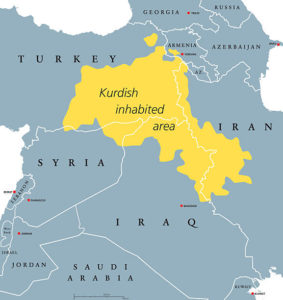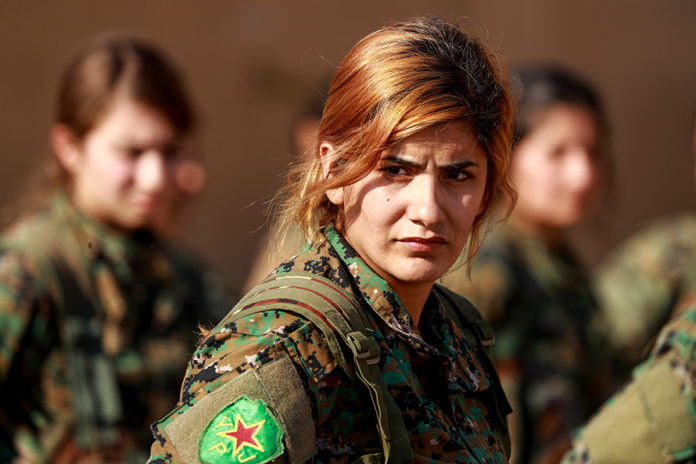Kurdistan is the largest stateless nation in the world, a nation divided between four states: Turkey, Syria, Iraq and Iran. The Kurds have some accepted autonomy in Iraq, but not in the other states. Moreover, they are persecuted and suffer violent oppression due to the constant violation of their national rights, especially in Turkey, Syria and Iran.
In Syria, the Kurds – after the Arabs – are the second largest ethnic group. They live in northeastern Syria, and represent around 10% of the population of that state, some two million people. They speak mainly Kurdish and suffered harsh repression under the Al-Assad dictatorship. The only official language in Syria is Arabic, and Kurdish has no legal recognition there.
In December 2024, the Islamist armed group HTS entered Damascus and put an end to the Al-Assad dictatorship, after 13 years of bloody civil war. This war involved supporters of the Bashar al-Assad regime (supported by Russia and Iran), on the one hand, and numerous anti-Assad military groups (Sunni Islamists, Kurds, Arab rebels), supported by Turkey, the USA and Saudi Arabia, on the other.
The Kurds under Syrian domination fought hard against the Al-Assad dictatorship, especially from 2011 onwards. And also against the fundamentalists of the Islamic State, known as Daesh, who conquered vast tracts of land during the Syrian civil war. The Kurds were assisted by the U.S. on this second front.
WHO’S WHO IN THE SYRIAN CONFLICT:
There have been three main military groups that have confronted Al-Assad, all of which have played a major role in the regime’s demise:
– SNA: Syrian National Army. It is a coalition of armed groups, supported and financed by Turkey, which maintains a fierce opposition to the Kurds.
– SDF: Syrian Democratic Forces. These are military groups led by the Kurds through the PYD party, with U.S. support. They control the territories of northeastern Syria, where they have established an autonomous territory (Rojava or AANES). The Kurdish government has succeeded in having the autonomous region of AANES considered by international observers as the most democratic, secular, tolerant and wealthy in all of Syria.
– HTS: Haiat Tahrir al-Sham. It is an Islamist coalition that seems to have evolved from jihadism to a more moderate Islamism. Although in the past it was an enemy of the Kurds, it now says it is willing to create a federal state in Syria, and to grant autonomy to the Kurds. The Kurds, however, do not trust this coalition. Abu Mohamed Al Julani is the top leader of HTS.

WHAT STANCE WILL THE NEW SYRIAN GOVERNMENT TAKE WITH THE KURDS?
Following the fall of the Al-Assad dictatorship, HTS has taken the reins of the interim government in Syria. The new president, Mohamed al-Baixir, has promised that the interim government he heads will guarantee the rights of ethnic minorities in Syria and that he is willing to grant autonomy to the Kurds within the Syrian state. In return, he demands that the Kurds recognize the legitimacy of the new government. In order not to irritate Turkey, HTS is also demanding that the Syrian Kurds sever relations with the PKK – the Kurdistan Workers’ Party, a Kurdish terrorist organization according to the Turkish government-.
While the new Syrian government is trying to show an open attitude (although his supposed Islamist moderation is yet to be proven) , the SNA militias, financed by Turkey, are carrying out attacks against the Kurds in northern Syria. According to Turkey, the Syrian Kurds support the PKK militants, who are Turkey’s bête noire. Moreover, according to Ankara, the autonomous territory that the Kurds have established in northeastern Syria poses a serious threat to Turkey, as it can “infect” Turkish Kurds and rekindle their sovereignty cravings. Turkey has been a loyal ally in the fight against Al-Assad, and the new Syrian government does not want to irritate that ally. It therefore has a difficult balancing act to match Turkey’s interests and those of the Kurds. The phrase “The enemies of my enemies are my friends” does not hold true in the new Syria, for despite their commonality in the fight against al-Assad, aversion reigns between the SNA and the SDF. Recently, Turkish President Erdogan called on the U.S. government to withdraw its support for the Kurdish “terrorists” as soon as possible.
In the ideological field, the difference between the Islamists and the Kurds must be emphasized. While the Kurdish political parties are secular, HTS and Arab groups like it are fervent followers of the Islamic religion, and to date have not respected the rights of women and ethnic minorities. NAZIOGINTZA is in contact with several Kurdish activists, and they have told us clearly: the Kurds of Syria will not allow themselves to be dependent on an Islamist government. Their demands are twofold: to reverse the policies developed by the BAAZ party (of the Assad dynasty) in Syrian Kurdistan during the last 60 years, and to be able to maintain their linguistic, cultural and social identity through a broad political autonomy.
Will the Syrian government recognize the autonomous region created by the Kurds in AANES and accept a federal Syrian state? Will it keep its word to the Kurds, or will it bow to Turkish interests? It is difficult, at this stage, to make predictions in the tumultuous Syrian scenario.
Al Assad fell, but peace has not come to northern Syria, because Turkey (through the SNA) is bent on extending its particular war against the autonomous zone created by the Kurds.

